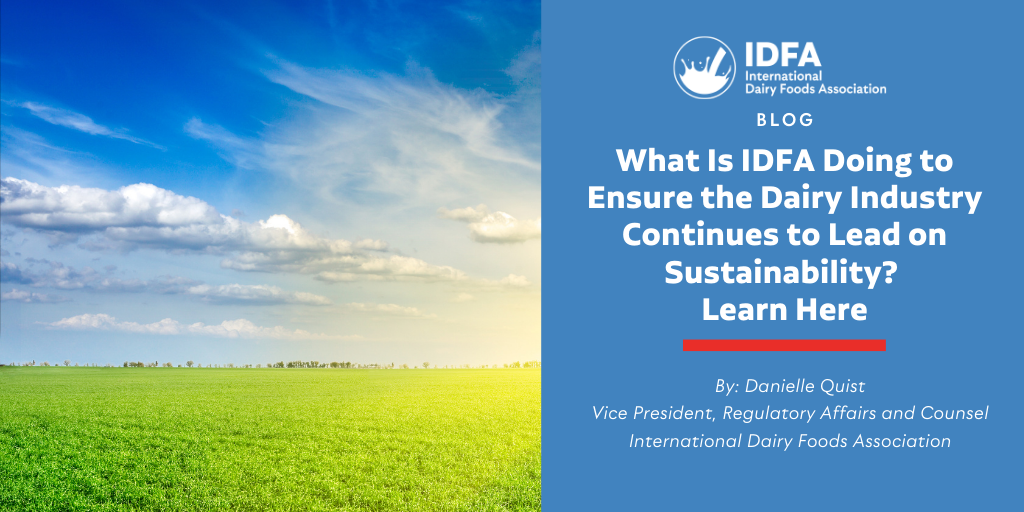As your trade association, IDFA knows that the dairy industry plays a vital role in sustainable food systems by nourishing people, communities, and the planet. But not everyone else knows it. So, how is IDFA making sure policymakers, regulators, and thought leaders know what dairy is doing on sustainability?
IDFA staff recently began a set of briefings with members to bring them up to speed on the many ways IDFA is engaging on sustainability policy and programming. Just recently, IDFA completed a strategic planning process that resulted in making sustainability 1 of 10 organizational priorities, better equipping IDFA to use its full set of resources to advocate on behalf of the dairy industry. Further discussions are planned with the IDFA Executive Council in January and May 2022 to further refine IDFA’s efforts. The IDFA team, however, has wasted no time in ramping up sustainability policy, advocacy, membership, and communications efforts. Here is a summary of what’s happening at IDFA related to sustainability.
Advocacy + Education + Training + Amplification
At IDFA, our sustainability work is focused on advocacy, education, training, and amplification. Earlier this year, IDFA added a Sustainability Amplification Platform to our website to serve as a clearinghouse for positive stories about how the dairy industry is leading on sustainability. On IDFA’s Sustainability Platform, you will learn about innovations in product development—such as the first PCR gallon milk jug offered by Clover Sonoma—as well as advancements in carbon neutrality from companies such as Aurora Organic Dairy, which achieved net neutrality in 2020. The IDFA Sustainability Platform is a good example of how we educate our stakeholders and use real world examples to advocate in front of legislators and policymakers. Visit www.idfa.org/sustainability to learn more.
Here are four ways IDFA is making a difference for a more sustainable future:
- Advocacy: We collaborate with IDFA members and partners to advocate to lawmakers and regulators at federal and state levels to influence the creation or implementation of policy with a direct impact on the dairy processing industry.
- Education: We detail the industry’s overarching, collaborative efforts to reduce GHG emissions, preserve soil health, and lower water consumption while maximizing recycling of packaging and environmentally conscious reuse of manure.
- Training: We offer training to our IDFA members on sustainability practices, benefits, and product innovations that would benefit their businesses and the industry as a whole. In addition to IDFA-led efforts, we partner with Global Dairy Platform and the Innovation Center for U.S. Dairy to support other training and education efforts.
- Amplification: Through strategic communications and campaigns, we amplify the sustainability efforts of our IDFA members and bring focus to IDFA’s policy and advocacy priorities.
IDFA Partners with the Dairy Industry
As a partner with the Innovation Center for U.S. Dairy, we support the dairy community’s aggressive environmental stewardship goals reflected in the Stewardship Commitment to advance dairy’s role in achieving GHG neutrality by 2050. How do we get there as an industry? The Net Zero Initiative (NZI) is the industry-wide, on-farm effort that will help U.S. dairy get to net zero. IDFA is a supporter of NZI. IDFA experts sit on boards and committees across the dairy industry to advance these commitments among our members and across the industry.
IDFA Offers Training & Education on Sustainability Efforts
We also offer a robust Virtual Programming calendar with webinars detailing how IDFA is advocating on state legislation related to PCR, as well as sessions educating our members on the latest PCR innovations and examples of how companies are driving value through sustainable practices. IDFA’s Business Partners—a broad community of service providers and subject matter experts working with dairy companies—provide a continuous source of knowledge alongside IDFA’s own SMEs. For example, several IDFA Business Partners offers services that help reduce energy use, lower water consumption, eliminate waste in supply chains, and more.
IDFA Advocates on Sustainability
Our goal in advocacy is to support laws, regulations, standards, and innovations that are not punitive but instead facilitate dairy processors’ ability to reduce greenhouse gas emissions, support animal welfare, minimize industrial and animal waste, improve water quality and availability, and achieve other economically feasible sustainability goals. We use examples of progress and innovation from our IDFA Sustainability Platform alongside real-world examples from IDFA members to make our case.
Recent examples of IDFA advocacy include working with IDFA members and other trade associations in urging Congress not to impose exorbitant taxes on plastic resin used in the manufacture of milk jugs and other federally mandated dairy food containers. We’ve engaged the Departments of State and Agriculture directly on the development of a so-called UN Global Plastics Treaty, sharing our industry’s perspective on the availability of alternative packaging materials and concern that negotiations do not result in new barriers to trade. At the same time, IDFA has been actively monitoring new laws in Maine, Washington, Oregon and California and educating members on how those laws will affect dairy product packaging in those states. Meanwhile, IDFA has been working collaboratively with state and regional dairy and food associations to influence the direction of recycling and food packaging legislation in states such as New Jersey and California to ensure that the dairy industry has access to recyclable and post-consumer recycled packaging materials that meet food safety requirements consumers have come to expect. We have also partnered with Ameripen—a leading voice on packaging—to remain proactive and bring solutions to the table related to sustainable packaging before state legislatures and Congress in the months and years to come. As a result of myriad state and federal policies under development on packaging, IDFA is in the process of finalizing a policy position with members of the IDFA Environment, Sustainability and Safety Committee to sharpen our advocacy and outreach.
We’re also focused on doing more to encourage practices that mitigate harmful impacts to our climate and the environment. In that regard, IDFA recently worked with member companies to show support for maintaining $28 billion in funding for voluntary, incentive-based conservation and climate programs in the reconciliation bill under discussion by the House and Senate.
The UN Food Systems Summit (UNFSS) presented an opportunity for IDFA to partner with organizations across food production, manufacturing and marketing to lay the groundwork for dairy to continue to occupy a central role in nourishing, sustainable food systems of the future. Early in 2021, IDFA joined the U.S. Coalition for the UN Food Systems Summit Engagement—a collaboration between the top U.S. food and agriculture industry associations and businesses. Through this coalition, we have shared common messaging and communications materials with the U.S. government and international policymakers involved in planning and influencing the Summit. We also strongly urged U.S. representatives to defend adherence to rules- and science-based domestic regulatory practices, as well as commitment to transparency and consensus-based standard-setting processes. In all engagements, IDFA and dairy partners shared how dairy companies are playing a leading role in publicly demonstrating their commitment to sustainability and achieving the SDGs.
Introducing the IDFA Sustainability Committee
Led by Danielle Quist, Vice President of Regulatory Affairs and Counsel, IDFA is in the process of separating the existing Environment, Sustainability and Safety Committee into two separate committees. IDFA is committed to working with dairy companies to ensure we lead on sustainability efforts and achieve the ambitious goals set out by industry leaders. That level of focus requires IDFA to update its toolkit, including its committees which review policy and make policy recommendations to IDFA staff for advocacy follow up. The first will be the IDFA Sustainability Committee wherein members will have more focused discussion on the sustainability issues impacting U.S. dairy processors and suppliers. The second will be the IDFA Environment, Health & Safety Committee and include more focused discussion on environmental, transportation, worker safety, and health regulations and policies. IDFA staff liaison Danielle Quist is reaching out to relevant professionals from IDFA member companies to join these new committees.
Leading on Sustainable Trade Principles
On international trade and exports, under the leadership of Becky Rasdall, Vice President of Trade Policy and International Affairs, IDFA issued the industry’s first-ever U.S. Dairy Trade Principles on Environmental Sustainability, a critical and proactive step as the global community rallies around climate change and initiatives begin to impact international trade. IDFA is urging the Office of the U.S. Trade Representative and USDA to use these trade principles to ensure the U.S. dairy industry is represented in any sustainability-focused trade agenda. The policy blueprint urges alignment of the environmental sustainability requirements with existing World Trade Organization (WTO) obligations and that they follow the most advanced science and promote innovation. Learn more here.
Demonstrating that Dairy Is Leading on Sustainability
Dairy companies are balancing the economic, social, and environmental aspects of sustainability throughout their operations. Companies are innovating for the future – finding ways to work more efficiently, develop new technologies, review sourcing options, reduce energy consumption, conserve water, and reduce emissions. Collectively, the U.S. dairy industry has committed significant resources to achieve ambitious environmental stewardship goals. Many businesses have incorporated environmental profit and loss metrics (EP&L) into their general accounting principles and practices to better understand where impacts exist, increase transparency to shareholders, and manage risk. As the industry leads in sustainability among food and beverage categories, IDFA is fully engaged to make sure the dairy industry is informed, and our voice is heard among decisionmakers.
Please watch this space to learn more about IDFA’s efforts to educate and advocate on behalf of our members on sustainability issues.
For questions, please reach out to me, Danielle Quist, vice president of regulatory affairs and counsel, at dquist@idfa.org.
# # #
The International Dairy Foods Association (IDFA), Washington, D.C., represents the nation’s dairy manufacturing and marketing industry, which supports more than 3.3 million jobs that generate $41.6 billion in direct wages and $753 billion in overall economic impact. IDFA’s diverse membership ranges from multinational organizations to single-plant companies, from dairy companies and cooperatives to food retailers and suppliers, all on the cutting edge of innovation and sustainable business practices. Together, they represent 90 percent of the milk, cheese, ice cream, yogurt and cultured products, and dairy ingredients produced and marketed in the United States and sold throughout the world. Delicious, safe and nutritious, dairy foods offer unparalleled health and consumer benefits to people of all ages.


